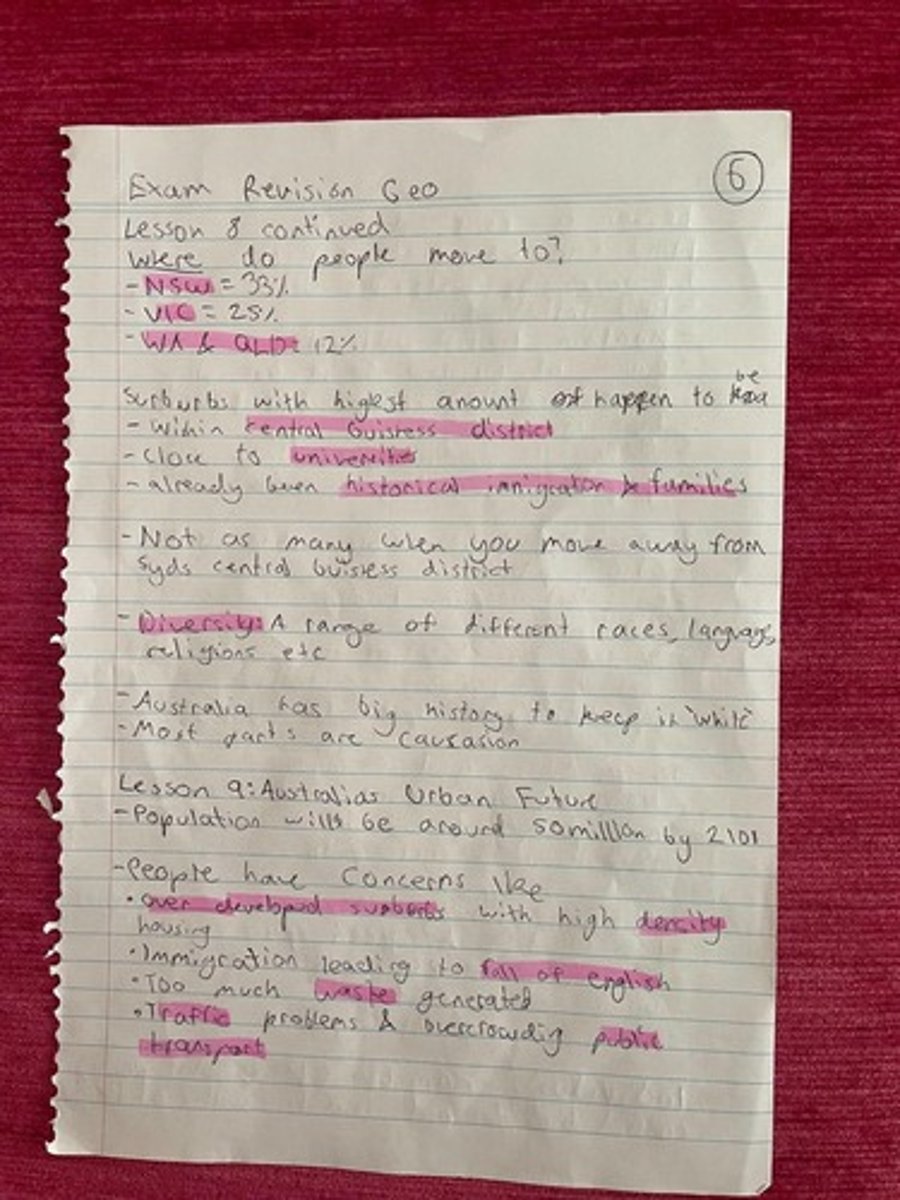Changing Places Year 9 Exam 1
1/27
There's no tags or description
Looks like no tags are added yet.
Name | Mastery | Learn | Test | Matching | Spaced | Call with Kai |
|---|
No analytics yet
Send a link to your students to track their progress
28 Terms
What are the two main ways people and places change?
Urbanisation and Migration.
What is urbanisation?
The movement from rural to urban areas to improve socio-economic standards.
What are some characteristics of urban areas?
High population, high population density, high-rise buildings and apartments, and infrastructure such as trains and light rails.
What percentage of Australia's population lives in urban areas?
89%.

What historical event significantly contributed to urbanisation?
The Industrial Revolution.
What are some positive consequences of urbanisation?
Economic growth, innovation, and cultural mixing.
What are some negative consequences of urbanisation?
Decreased incomes in rural areas, violent crimes, and increased pollution.
What is the economic consequence of urbanisation in China?
China has become the second largest economy in the world due to urbanisation and having the largest population.
What are the main urban settlement patterns in the USA?
High density along the East Coast (e.g., New York, Washington DC) and West Coast (e.g., California, Washington State), with sparse populations in the Midwest.
What factors influence urban settlement patterns?
Climate and topography, transportation networks, and perceptions of livability.
How does Australia's climate affect its population distribution?
Most habitable areas are along the coasts, while the north experiences cyclones and floods.
What role do transportation networks play in urbanisation?
They facilitate the movement of people and goods, leading to population growth near ports and cities.
What is urban sprawl?
The outward expansion of cities.
What are the characteristics of urban concentrations?
High traffic problems, pollution issues, and increased housing prices.
What is sustainability in the context of urbanisation?
Meeting the needs of the present without compromising the ability of future generations.
What are the two types of internal migration?
Temporary and permanent migration.
What is 'Fly In Fly Out' migration?
A temporary work arrangement where workers leave their homes for extended periods to work in mining towns.
What are some social consequences of internal migration in Australia?
Racist complaints and demographic changes.
What are the two main ways people migrate to Australia?
Through a migration program (work and family) and a humanitarian program (refugees).
What are the top two states in Australia where immigrants settle?
New South Wales (33%) and Victoria (25%).
What are some concerns about Australia's urban future?
Overcrowding, traffic problems, and waste generation.
What are some economically sustainable urban strategies?
Maintaining tourist attractions, diversifying businesses, and managing traffic.
What are some socially sustainable urban strategies?
Providing strong police presence, good schools, and maintaining public spaces.
What are some environmentally sustainable urban strategies?
Increasing green spaces, using renewable energy, and implementing waste management systems.
What is the significance of the Great Dividing Range in Australia?
It does not hinder population growth due to available space.
What percentage of Australia's land is uninhabited?
94%.
What is the impact of urbanisation on rural areas in Australia?
Rural areas experience job losses and decreased population.
What is the 'floating population' in China?
Temporary migrants who lack access to health care, unemployment benefits, or government services.